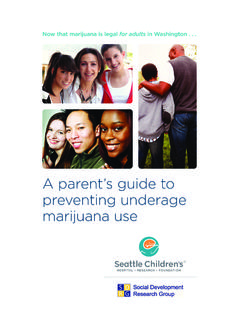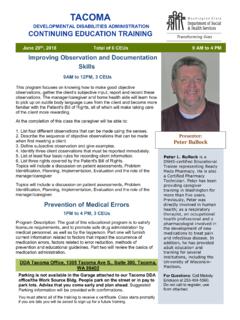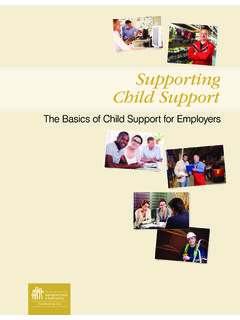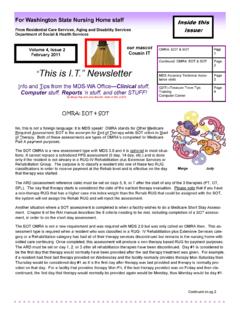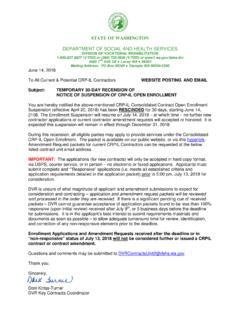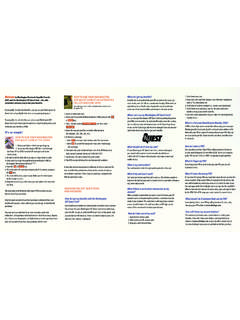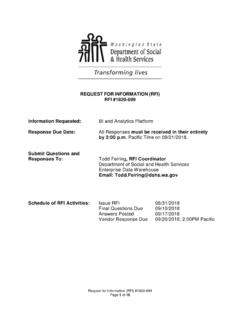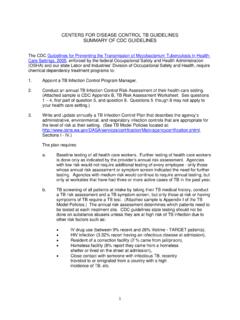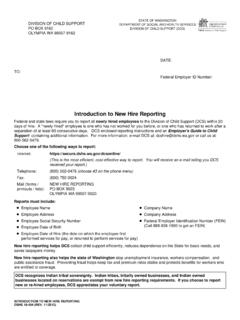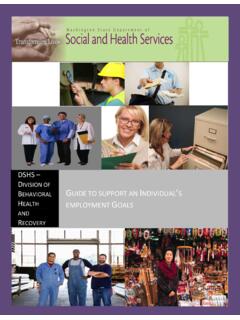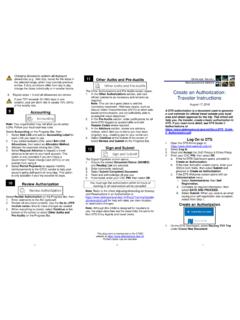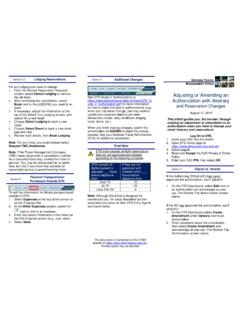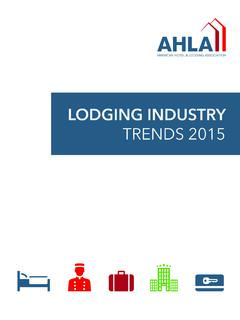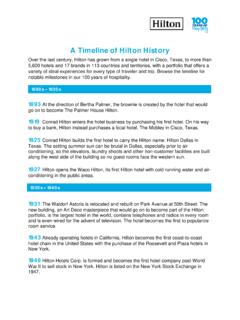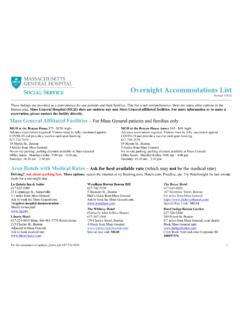Transcription of How Can I Become a Certified Peer Counselor? - Wa
1 How Can I Become a Certified Peer Counselor? WHAT ARE THE REQUIREMENTS TO QUALIFY AS A Certified PEER COUNSELOR? Certification has three steps: 1. Apply and be accepted to a training; 2. Successfully complete a 40-hour approved training; and 3. Pass the state exam. Upon passing the test, you will receive a letter confirming you met these requirements. Many employers also require you to be licensed by the Department of Health as an Agency Affiliated Counselor after being hired. Employers are generally knowledgeable about this process, or employees may contact the Department of Health directly. This license is only required for people providing Medicaid- billable services. WHAT ARE THE APPLICATION REQUIREMENTS? Applicants must meet the following requirements: 1. Identify as a consumer of mental health services as defined by WAC 388-865-0150.
2 Consumer means: o Someone who has applied for, is eligible for, or who has received mental health services. o Parents or legal guardians of a child under the age of 13, or for a child age 13 or older if parents or legal guardians are involved in the treatment plan. 2. Be age 18 or older. 3. Complete a high school diploma or hold a GED (This requirement may be waived or delayed in some circumstances). 4. Be in mental health recovery for at least one year. 5. Demonstrate qualities of leadership. 6. Demonstrate proficiency in reading comprehension and writing skills. WHAT IF I AM A PEER WITH CO-OCCURRING OR SUBSTANCE USE ISSUES? Currently, licensing and training are only available to peers with mental health or co-occurring disorders. This is due to funding rules. DBHR is committed to behavioral health integration and is seeking approval for peer support for those who are in recovery from substance use.
3 WHERE DO I FIND AN APPLICATION? The training application link is available on our Peer Support page. The application includes an instruction page, which should be followed carefully. HOW DO I APPLY FOR TRAINING? Beginning March 1, 2015, applicants may send an application directly to the trainer for each training they are interested in. Applications are no longer sent to DBHR, except as described on the peer support website. Once your application is received, it will be reviewed and scored. Applications which are incomplete or do not meet training qualifications are returned. Trainers will contact you about class openings or if a class fills. WHAT CAN I DO IF A TRAINER DOES NOT APPROVE MY APPLICATION? You may forward your application to DBHR with a request to have your application reconsidered. If DBHR approves your application, the trainer will be contacted and you will be considered for training.
4 HOW DO I COMPLETE AN EXCEPTION TO EDUCATION REQUIREMENT LETTER? Applicants who have not received a high school diploma or GED may apply for an educational requirement exemption. Applicants must write their own letter of request, without assistance, to accompany their application. The letter should explain the circumstances that prevented them from completing the educational requirement and describe how they have gained comparable reading and writing abilities. The letter must demonstrate high school level writing skills and a learning plan to complete the requirement. Letters should be sent to the contact person listed below. HOW ARE TRAINING PARTICIPANTS CHOSEN? When trainings are scheduled, participants are invited using various criteria, such as those already employed, those living in the area of the training, or those scoring highly on their applications.
5 Applicants must be interested in becoming Certified Peer Counselors for Medicaid-billing agencies, as our funding usually does not allow training for other professional development or personal growth. Please note that there are usually far more training requests than there are training spaces. Applicants will be notified whether they have been selected to attend a requested training. IS THERE A WAITING LIST? DBHR is discontinuing a wait list, and encourages applicants to apply for all appropriate trainings. This direct process will allow applicants to be notified about trainings more quickly and ensure application information is current. WHAT TYPES OF TRAINING ARE AVAILABLE? There are currently three Certified Peer Counseling trainings available: Standard training, Family and Youth training, and Spanish training. All trainings result in the same certification.
6 There is a box on the application form to indicate preferences. Trainings may be sponsored either by the State of Washington or a Regional Support Network. All known training dates and locations are listed on the website. Regional Support Network trainings are limited to participants from a particular region, and may have their own priorities for training. WHAT IS THE FAMILY/YOUTH TRAINING? The Division of Behavioral Health and Recovery piloted a new curriculum in Family and Youth Certified Peer Counselor training in 2013. This training, while covering the same topics as the standard training, is specifically designed to prepare parents and youths as Certified Peer Counselors. Parents and youth often benefit from learning with a larger group of their peers. There is no age requirement for the youth training, but applicants are expected to be of a similar age or have substantial experience working with youth.
7 The ability to form true peer relationships is the most important criteria. Parents and youth are welcome to take the standard training as well. Those working on WISe teams are required to take a Family/Youth training, unless an exception is made. WHAT IS THE APPLICATION PROCESS? Applicants print and fill out the application form on the website, following all instructions. Applications are submitted directly to the trainer for each training. HOW MUCH DOES TRAINING COST? There is no cost for peer counseling training, training materials, or the test. Trainings that are offered regionally provide snacks and lunch, while statewide trainings also provide lodging and all meals. IS THERE TRAVEL SUPPORT AVAILABLE FOR TRAINING? Generally, travel to and from the training is not covered. Regional Support Networks do not provide for travel support.
8 For the seven state standard trainings (not the Youth/Family trainings), there are limited funds available to assist participants coming from long distances within the region. This support is generally for hotel lodging and meals. If you are from a rural area or live at a considerable distance from the closest training, please contact the trainer for an application. WHAT IS THE TRAINING LIKE? All trainings are 40 hours in length. Most are five days, although some are split over two weeks or weekends. Students primarily study the peer counselor manual, which includes many individual and group activities. Trainings are interactive, with students expected to participate actively in activities and discussions. Students are also expected to follow a Code of Conduct to be safe and successful in the training. WHAT IS THE TEST LIKE?
9 The DBHR test is administered by one contractor, currently Washington State University. The test will be held near the training location approximately 2-3 weeks after training. The test has a written multiple choice section and an oral section answered to a small panel. Applicants have three attempts to pass the test. They may then request re-training, but this opportunity is not guaranteed. HOW IS DBHR S PEER COUNSELING PROGRAM DIFFERENT FROM OTHER PEER PROGRAMS? Many organizations provide peer support and training. Some examples are NAMI s Peer to Peer, WA Dads, and Recovery Innovations training. Although these programs may be very helpful to individuals, DBHR has no authority or oversight of these programs. The DBHR program of peer support is the only state-approved pathway to qualify to work in a Medicaid-funded agency.
10 WHO SHOULD I CONTACT FOR MORE INFORMATION? Bonnie Staples, Mental Health Program Administrator DSHS Division of Behavioral Health and Recovery PO Box 45330 Olympia WA 98503 360-725-1883 or (888) 713-6010 (please call if your question is lengthy) You may also contact Wanda Johns, Program Assistant, 360-725-1718.
